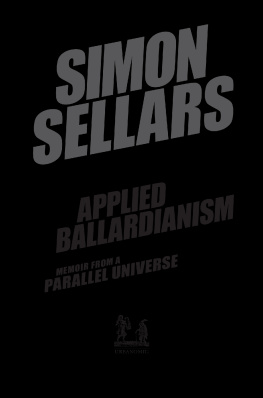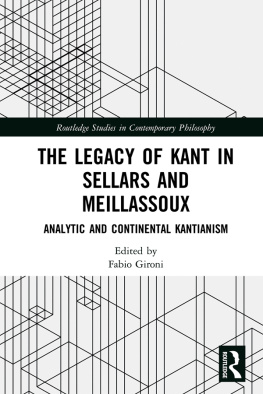Simon Sellars - Applied Ballardianism
Here you can read online Simon Sellars - Applied Ballardianism full text of the book (entire story) in english for free. Download pdf and epub, get meaning, cover and reviews about this ebook. year: 2018, publisher: Urbanomic Media Ltd, genre: Detective and thriller. Description of the work, (preface) as well as reviews are available. Best literature library LitArk.com created for fans of good reading and offers a wide selection of genres:
Romance novel
Science fiction
Adventure
Detective
Science
History
Home and family
Prose
Art
Politics
Computer
Non-fiction
Religion
Business
Children
Humor
Choose a favorite category and find really read worthwhile books. Enjoy immersion in the world of imagination, feel the emotions of the characters or learn something new for yourself, make an fascinating discovery.
- Book:Applied Ballardianism
- Author:
- Publisher:Urbanomic Media Ltd
- Genre:
- Year:2018
- Rating:5 / 5
- Favourites:Add to favourites
- Your mark:
- 100
- 1
- 2
- 3
- 4
- 5
Applied Ballardianism: summary, description and annotation
We offer to read an annotation, description, summary or preface (depends on what the author of the book "Applied Ballardianism" wrote himself). If you haven't found the necessary information about the book — write in the comments, we will try to find it.
Applied Ballardianism — read online for free the complete book (whole text) full work
Below is the text of the book, divided by pages. System saving the place of the last page read, allows you to conveniently read the book "Applied Ballardianism" online for free, without having to search again every time where you left off. Put a bookmark, and you can go to the page where you finished reading at any time.
Font size:
Interval:
Bookmark:
Psychic Combat
I can trace my decline. That is one of the bittersweet benefits of survival. I can locate the exact moment in time when I joined the theatre of the unwell. I was a high school dropout, pinballing between dead-end jobs. Once a bright student, Id squandered my ambition, melting like a fuse under excessive voltage. No one knew why, let alone me. I turned inwards but nothing held my stare. The void was too deep.
I lost sight of myself within an interminable fever dream.
I awoke inside an anomalous world.
Something was waiting, oddly familiar.
Another version of me.
A clone, threatening me with erasure.
I was left with no choice but to spark an internal war. The mission: take out the clone. But the fight would expose me to interdimensional radiation. I became sick with time, unable to distinguish between the past, present and future. Whats more, I was unskilled in psychic combat, asking the wrong questions and opening the wrong doors.
The dark matter burned me from inside.
Sacrificial Weapon
It was the early 90s, the zenith of cyberculture, an incandescent moment when the embryonic internet went nova. The net was wild and untamed, a frontier zone occupied by hackers, digital pirates and online insurgentsa cadre of undesirables romanticised in glossy cyberphile magazines. But in the land of the terminally unhip, it was a different story. Distinguished TV personalities made fools of themselves live on air, asking What is internet, anyway? and struggling to pronounce the @ symbol. The divide was clear. You were either a fearless cybertrooper storming the gilded gates of tomorrow or a clueless rube snowblind from pixel blizzards.
The net was hyped as a step change in human evolution. One day, thundered the cyberprophets, consciousness would be uploaded to computer mainframes, ditching the body like a booster rocket. The body was dead weight, so much meat, and cyber fads like body modification displayed contempt for physical limitations. Swept up in the fervour, I pierced my nose in three places and my tongue in two, but instead of ascension to an enlightened state, all I received was a nasty sinus infection and a speech impediment that lasted for months.
A gaggle of Californian cyberhippies had come to dominate cyberculture, peddling snake oil about digital utopias and the net as the new home of mind, but their dull rhetoric, forged from white-male privilege, left me cold. Where was the danger, the excitement, the diversity? My discontent drew me to cyberpunk, the nihilistic science fiction genre that would expunge forever the hippy communes transplanted from the desert to the net. It was a stark corrective to cyberutopianism. In cyberpunk, virtual reality is the new normal. Alienated loners log onto cyberspace via neural interface, their minds conjoined, their bodies lifeless and slack, but when things go bad the nervous system is destroyed and the mind is warped. Sometimes, death is the consequence. It was a worldview I could buy into.
Cyberpunk was a more accurate summation of the era, predicting startling research that exposed a sickness at the heart of our culture. In the wake of the cyberprophets, the global news agency Reuters had released a provocative report on information overload that was beginning to unnerve even the staunchest adherents. It detailed how the sum total of all available information was doubling in increasingly shorter amounts of timea tsunami of data swamping the mind, streaming uncontrollably from the new overlapping technologies of faxes, mobile phones, modems, internet and online conferencing. Meanwhile, the human cost of assimilating and processing this material was increasing exponentially. The result was Information Fatigue Syndrome, a peculiarly 90s phenomenon that atrophied attention spans, shut down the mind and depleted the body. Symptoms included hyper-aroused psychological condition, paralysis of analytical capacity, anxiety and self-doubt, and a capacity for foolish decisions and flawed conclusions. These matched my own situation, for I was nothing if not indolent, and I made an appointment with the doctor to complain about my malaise, which now had a name.
The so-called medical practitioner regarded me with barely concealed contempt as I shrouded my condition in pseudointellectual babble, quoting the Reuters report in a pathetic attempt to make my situation appear more significant than what it was: the torpor of a degenerate slacker. Information Fatigue Syndrome seemed heroic, an unavoidable consequence of serving in the Info War, of sustained immersion within the new cyber dawn of virtual reality and wraparound technology.
Im a cyberwarrior, I told him. And my mind is going.
The doctor rose wearily from his seat and walked to the medicine cabinet. On his desk was a set of golden blades. I supposed they were scalpels of some kind, but in any case medical scenes always made me nervous and paranoid, and the implements induced a rising panic. The blades were alarming, their geometry mystifying. One of the handles resembled a human knuckle, attached to a point so sharp it seemed to disappear into thin air, and I shuddered at the thought of the atrocities that could be committed with this sacrificial weapon.
He returned with an unmarked box of pills. He explained their purpose and gave me instructions for taking them, but the details failed to register, since I was distracted by an attractive middle-aged nurse whod been observing our interaction. I felt a deep stirring of the loins. She seemed completely present in some recondite way, as if Id always known her.
I left the clinic carrying the box, remembering nothing of the doctors instructions. I opened it. A small, shiny disc fell into my hand.
It was mauve in colour, engraved with the crude outline of a dove.
Still World
The pills generated monstrous side effects. After ingesting them, Id fail to remember thoughts Id had moments before. Sometimes, Id lose contact with critical childhood memories, even my own name and age, as if entire swathes of my brain had been wiped. This freefall within mindspace would always be accompanied by chaotic spatial disorientation. Walls would fall away, exposing an inky blackness. Floors would vanish, plunging me into a bottomless chasm.
In the precious moments between these apocalyptic hallucinations, I managed to hold down a part-time job in a warehouse on the outskirts of town. The warehouse belonged to a wholesale distributor, which supplied stationery and magazines to a chain of newsagents. My job was to heat-seal ballpoint pens into plastic blister packs. At the rear of the building was a storeroom for remaindered stock. One day, during a tea break, I scavenged it looking for something to read. Tempted by a cache of soft-porn periodicals, my eye was drawn to one cover above all. It featured a seductive young woman, her face flushed by a lurid red filter. Sporting devil horns and a saucy grin, she extended her tongue and winked at the camera. It wasnt a porno rag but an edition of i-D magazine, the popular fashion chronicle from the 80s, titled The Fear Issue.
On the cover, arranged around the woman in the largest font, blared the headline for an interview with trash-metal musician Zodiac Mindwarp. Progressively smaller fonts advertised other attractions: an interview with legendary gonzo writer Hunter S. Thompson and a heading that simply screamed UFOS!. Tantalised by this vivid mishmash of faded heroes and hypercurrent fads, I scanned the contents, only to discover an essential field guide to the future : an interview with cult author J.G. Ballard, nestled among the back pages.
In the 60s, Ballard had made his name as a science fiction writer, but he was on an elliptical orbit far distant from planets Asimov, Heinlein and Clarke. As a boy, I devoured science fiction but I never read him. He was too far underground. I knew of him through blurbs for his work tucked away in the endpapers of less esoteric novels. I was a simple lad keen on Doc Smiths Lensmen series, the sappiest of Boys Own space operas. What was I to make of works described by shell-shocked copywriters as chill splinters of unreality and the source of a bleak new evil?
Next pageFont size:
Interval:
Bookmark:
Similar books «Applied Ballardianism»
Look at similar books to Applied Ballardianism. We have selected literature similar in name and meaning in the hope of providing readers with more options to find new, interesting, not yet read works.
Discussion, reviews of the book Applied Ballardianism and just readers' own opinions. Leave your comments, write what you think about the work, its meaning or the main characters. Specify what exactly you liked and what you didn't like, and why you think so.






